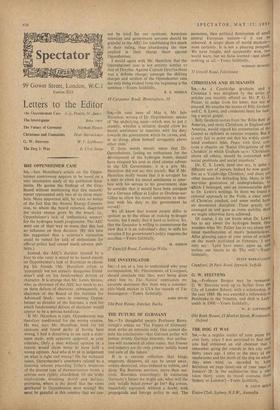Sta,—In your issue of May 6, Mr lain Hamilton, writing
of Dr. Oppenheimer. speaks of 'the underlying issue—which was, to put it crudely, whether a scientist should allow his moral sentiments to interfere with his duty towards the government which he serves, and, in so doing, place himself arrogantly above other men.'
If these words merely mean that Dr. Oppenheimer, feeling no enthusiasm for the development of the hydrogen bomb, should have resigned his post as chief atomic adviser to the US Government, it is a pity Mr. Hamilton did not say this plainly. But if Mr. Hamilton really means that it is arrogant for a man to allow his moral sentiments to inter- fere with his service to his government, does he consider that it would have been arrogant for a German officer at Lidice or Oradour-sur- Glane to allow his moral sentiments to inter- fere with his duty to the government he served?
We all know that honest people differ in opihion as to the ethics of making hydrogen bombs; but I really find it hard to believe, Sir, that the Spectator is willing to countenance the view that it is an individual's duty to stifle his scruples if his government's policy requires the sacrifice.—Yours faithfully,
37 Eastclifi Road, Tunbridge Wells. M. JUDSON


































 Previous page
Previous page